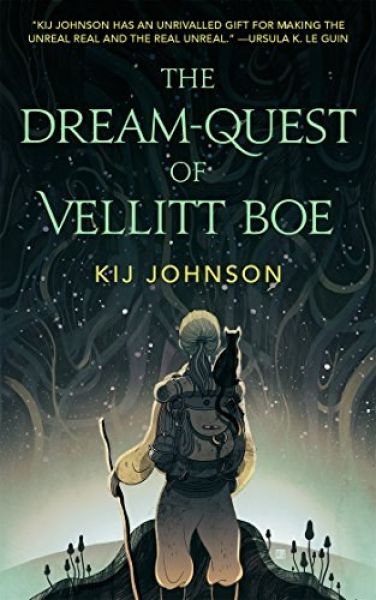Take a Dream on a Sunday
The Dream-Quest of Vellitt Boe
By Kij Johnson

18 Jan, 2017
0 comments
Although modern discussion of Howard Phillips Lovecraft’s fiction often focuses on his virulent racism, he was also something of a misogynist. His female characters tended to be absent or objectionable. Is it possible to write in the Lovecraftian vein without racism and misogyny? Or is Lovecraft’s world of eldritch horrors dependent on rampant hatred of the Other?
Kij Johnson’s 2016’s The Dream-Quest of Vellitt Boe is something of a test for the hypothesis “I can write Lovecraftian fiction that does not reek of hatred and disgust.” It is also a test of my recent suggestion that the most flawed originals can inspire the best modern interpretations.
Professor Boe is woken from a sound sleep to deal with a crisis. One of her most promising students, Jurat, has eloped with a lover, Heller. Heller is objectionable because he is a dreamer from the waking world and it is to the waking world Jurat and Heller are fleeing. The university’s toleration of Ulthar Women’s College is grudging at best. If news gets out that the daughter of a trustee has been … misplaced, the hard-won women’s college might be shut down entirely.
Someone must retrieve Jurat. Retired adventurer Boe is the logical choice.
Accompanied by her cat, she sets out to find Jurat before it is too late. Although a sedentary professor now, in her youth Boe wandered the weird, dangerous realms of the Dreamlands. She has a proven track record of evading the grasping extremities of Dreamlands creatures and of dealing successfully with voracious ghouls. If any of the faculty can succeed, it is Boe.
The stakes are higher than Boe knows. Losing Jurat risks attracting the ire of an ancient god. In the Dreamlands, the gods are very real, very powerful, and fond of disproportionate retribution. The College depends on Boe’s success. So do the lives of everyone near Ulthar.
~oOo~
I would like to assure everyone familiar with horror movie tropes that nothing bad happens to the cat.
[Editor’s note: Phew!]
Johnson is one of those authors whose fiction I always like (when I do read it) and yet … I seem to forget to look for her books in libraries, or on lists of new fiction. It’s an odd cognitive blind spot.
It’s easy to die in the Dreamlands. One might be murdered and eaten by ghouls, overpowered and eaten by grotesque gugs, trapped in a crystalline expression of a god’s rage. Few die of old age in this world, so it says a lot about Boe’s competence that she survived a life of adventure long enough to be middle-aged. One expects that a story featuring one of her college colleagues would be much shorter and end with wet crunching sounds.
Much of what Boe has to face is alien; some of it is terrible. There isn’t the trembling fear of the other that one expects from Lovecraft. There are no horrified reactions to a revelation that one’s family tree is not quite as previously described. (Although, in near-Lovecraftian fashion, one character does have to deal with the implications of who or rather what they really are.)
It was pleasant to read a novel about a competent middle-aged woman doing adventurous things. Not only that, I liked Boe. I cared what happened to her and her student. It was also pleasing that the author did not simply discard the problematic elements of the original but engaged with them. She did not simply engage in the written equivalent of using CGI to remove unwanted pistols and cigarettes. Authors who want to tackle challenging older material should consider this a book to emulate.
The Dream-Quest of Vellitt Boe is available here.
